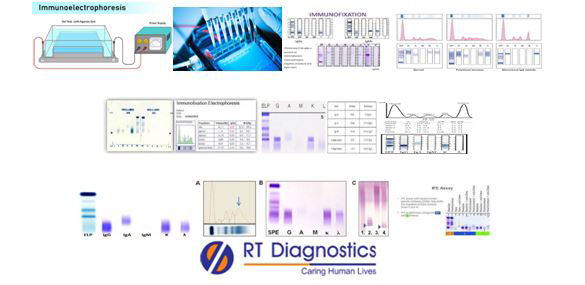Immunofixation Electrophoresis:
Why Immunofixation Electrophoresis Test?
CLINICAL INFORMATION
Electrophoresis (In Greek means to “bear electrons”) is the motion of dispersed particles relative to a fluid under the influence of a spatially uniform electric field. Electrophoresis is an analytical technique used in chemistry for separating molecules by size, charge and/or binding affinity etc. Moreover, the application of its principle behind the phenomenon of electrophoresis is, also applied in the field of biochemistry research and bio-medical laboratories to separate macromolecules based on the size of the molecules. This technique applies a net negative charge to the sample specimen so that the proteins and/or nucleic acids migrate towards the positive charge. Electrophoresis is exclusively applied (like blotting techniques – southern blot, northern blot, western blot etc) in the biochemical analysis of unknown sample specimens of the patients. Therefore the technique of Electrophoresis is extensively applied in the analysis of nucleic acids like (DNA and RNA) and protein studies in the field of medical research and in laboratory diagnosis. The Immunofixation test is also known as serum protein electrophoresis. An immuno-fixation is a blood test (or sometimes can be performed in urine specimen also eg.Multiple myloma). It is also known as protein electrophoresis. Proteins are macromolecules made up of amino acids (building blocks for proteins). Since they are all charged particles, the analytical method known as electrophoresis is applied for separating these biological substances. The principle behind this test is the separation of charged particles based on size and electric charge. Two main types of blood proteins are albumin and globulins. They are further classified into subgroups namely albumin, alpha-1 globulin, alpha-2 globulin, beta globulin and gamma globulins. Estimation of these proteins helps to screen diagnose certain pathologies (variety of diseases) associated with it eg. Lymphoproliferative disorders -Waldenstrommacroglobulinemia etc. This test helps to diagnose pathologies such as multiple myloma (confirmation of “M –Spike” i.e peaks and valley bands, shows the presence of monoclonal antibodies produced by the tumour of plasma cells i.e presence of abnormal immunoglobulinseg. IgGs), lymphoma, leukaemia, kidney disease, liver disease, auto-immune diseases etc. Some of the indications for this test can be due to certain clinical pathologies such as pain in the backbone, pain in the rib bones, fatigue, weight loss, recurrent infections, nausea, vomiting, bleeding from the nose and gums, swelling of the liver, spleen, lymph nodes etc. Low protein levels could be due to kidney disease, liver disease, alpha-1 antitrypsin deficiency, malnutrition etc. While high protein levels may be due to dehydration, liver disease, inflammation, liver disease, kidney disease, Multiple myeloma, lymphoma, amyloidosis, certain cancers, infections etc. Other additional tests include immunophenotyping by flow cytometry etc.

General Instructions:
Sample Requirement: Specimen - Blood sample collected from the vein. Test Preparation: None.
NOTE - Sample for specimen collections may vary based on the patient’s condition/cases according to the patient’s presenting complaints/signs or symptoms:
SPECIMEN REQUIREMENT (Special or Rare Cases) - As instructed and guided by Physician / Clinician / Pathologist / as per Laboratory’s requirements, according to procedures and protocols.
This Multi-Specialty Clinical Referral Laboratory RT DIAGNOSTICS provides precise and accurate tests with an extensive range of testing services to the medical centres to help in the diagnosis and identification of pathology in the test specimens for infectious diseases and also to evaluate the function of organ systems of the patient. It prevents further complications and helps to stabilize and restore health to near normalcy at the earliest without delay.



